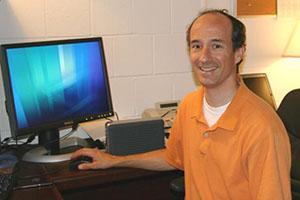Meet EPA Scientist Robert Janke
Improving Water Systems to Protect Our Drinking Water
EPA scientist Robert Janke has worked in EPA’s National  EPA scientist Robert JankeHomeland Security Research Center in Cincinnati, Ohio since 2003. He is a founding member of the Threat Ensemble Vulnerability Assessment (TEVA) Research Modeling Program and is also one of the designers of the popular TEVA-SPOT, a graphical user interface software program. Prior to joining EPA, he spent 12 years with the Department of Energy conducting and evaluating modeling studies and risk assessments to support environmental remediation. He was actively involved in the design, construction, and deployment of real-time radiological detection instrumentation for remediating large, outdoor surface areas contaminated with radionuclides.
EPA scientist Robert JankeHomeland Security Research Center in Cincinnati, Ohio since 2003. He is a founding member of the Threat Ensemble Vulnerability Assessment (TEVA) Research Modeling Program and is also one of the designers of the popular TEVA-SPOT, a graphical user interface software program. Prior to joining EPA, he spent 12 years with the Department of Energy conducting and evaluating modeling studies and risk assessments to support environmental remediation. He was actively involved in the design, construction, and deployment of real-time radiological detection instrumentation for remediating large, outdoor surface areas contaminated with radionuclides.
How does your science matter?
My research is focused on improving the security of water systems while also improving how they are managed and operated. I want to help change the way that water systems look at and use their infrastructure models and data assets. Technological advances together with advanced data analytics can be efficiently used to provide a real-time understanding of what is happening in the water distribution system and help address a host of 21st century problems.
I am fortunate because I work on drinking water, specifically making drinking water systems more secure, reliable, and resilient. What could be more important than clean, potable water and its safe and dependable delivery?
When did you first know you wanted to be a scientist?
I’ve known since I was very young, because I was always interested in science and inventing things.
What do you like most about your research?
I like that my job is to keep learning! I like to joke that working at EPA in research is like being back in school without the tests! I enjoy reading papers and working on publications. I also enjoy working with computers and running “what if” scenarios on water systems using our high performance computing system.
If you could have dinner with any scientist, past or present, who would it be and what would you like to ask him or her?
Probably Richard Feynman and Sam Harris. For Feynman, a physicist, I would be happy to just have been able to meet him and listen to one of his many fascinating stories. For Harris, as a philosopher and neuroscientist, I would love to talk with him about his work with Project Reason and what he think it means to the future of people as well as our planet.
Tell us about your background.
I have a Bachelor of Science in Chemistry and a Master of Science in Health Physics, both from the University of Cincinnati. I was fortunate during my undergraduate years to work at Children’s Hospital Medical Center in the Gastroenterology Department. I performed radioimmunoassay tests on bile acids and research studies on liver enzymes. I had some really great mentors whose advice and guidance was instrumental to my career.
If you weren’t a scientist, what would you be doing?
Riding my bike!
Any advice for students considering a career in science?
I recommend that students work on acquiring a toolbox of advanced technical skills, i.e., mathematical, analytical, and computational. I would tell them that, “A toolbox of capabilities, along with discipline and hard work, will take you far!”
